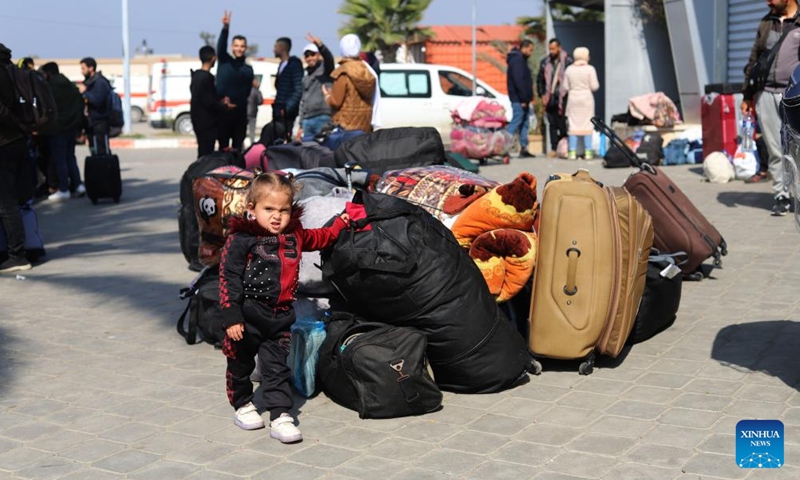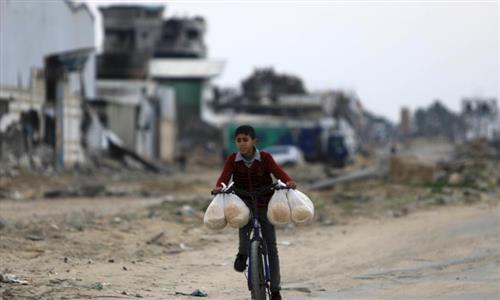War in Gaza looms at UNHRC session
World calls for unity, rejects bloc confrontation amid UNSC division

People wait to leave for Egypt via the Rafah crossing in the southern Gaza Strip, Feb. 25, 2024.(Photo: Xinhua)
UN Secretary-General António Guterres, when addressing the 55th session of the United Nations Human Rights Council on Monday, warned that an all-out Israeli offensive on Rafah would spell the end for UN-led humanitarian relief to the people of Gaza, according to a report on the UN official website on Monday.
Though the council meeting touched on a wide range of topics, the war in Gaza was the focal topic.
Observers said on Tuesday that the UN session is issuing a crucial call at a critical moment, since unilateral moves and bloc confrontation mind-set of the US has jeopardized the authority and functioning of the UN bodies when Israel's assault had claimed nearly 30,000 Palestinian lives and displaced 2 million.
Any further extension of Israel's ground operation in the south of Gaza "would not only be terrifying for more than a million Palestinian civilians sheltering there; it would put the final nail in the coffin of our aid programs," Guterres said.
Guterres also reiterated his longstanding concerns about the UN Security Council (UNSC), which he said was "often deadlocked, unable to act on the most significant peace and security issues of our time."
Chinese Foreign Minister Wang Yi, also a member of the Political Bureau of the Communist Party of China Central Committee, said during the UNHRC session that multilateral human rights bodies should serve as platforms for constructive engagement and cooperation for all sides, rather than a battleground for group politics or bloc confrontation, Xinhua News Agency reported on Monday.
Noting that the ongoing Palestinian-Israeli conflict has cost the lives of nearly 30,000 civilians, and left close to 2 million people displaced, Wang said it falls upon the entire international community to protect the human rights of all ethnic groups and all people in a fair, equal and effective way.
The US again vetoed a UNSC resolution demanding an immediate cease-fire in Gaza, after circulating its own deal linking a temporary cease-fire to the release of Israeli captives. The third veto on February 20 has left itself in isolation from the international community.
Zhu Yongbiao, director of the Center for Afghanistan Studies at Lanzhou University, told the Global Times on Tuesday that the US has been standing with Israel. No matter how the situation develops and how the humanitarian crisis further aggravates, the US did not change its stance even it means standing in opposite to most countries now.
That has threatened the unity of the UNSC and hindered the council from taking meaningful actions, Zhu said.
The US' unilateral move also demonstrated that its repeated citation of "human rights" to comment on and interfere in other countries' affairs is weaponizing the concept and hypocritical, Zhu said.
Divisions not only emerge at the UNSC, but also domestically in the US. An active US Air Force serviceman set himself on fire on Sunday in front of the Israeli embassy in Washington DC to protest against the Gaza war, Reuters reported on Monday. Footage circulating online shows the man shouting "I will no longer be complicit in genocide."
US media are quite silent on the incident as "it would further bring shame on US image and prompt doubts on its foreign policy in Mideast," Zhu said, as he pointed out US double standards on "freedom of press."
On the Palestinian-Israeli conflict, US has been adhering to bloc interests regardless of basic justice, boasting for lofty concepts while acting the opposite, analysts said.
Liu Zhongmin, a professor at the Middle East Studies Institute of Shanghai International Studies University, told the Global Times on Tuesday that the US, although having mediated a temporary cease-fire deal, is playing a more destructive rather than constructive role in the big picture of Palestinian-Israeli conflict.
US mediation is just a diplomatic gesture to appease international and domestic criticism on its current policy when Biden administration wants to focus resources on the upcoming presidential election, Liu said.
As for Israel, there is no sign of abandoning its original goal of "total victory" against Hamas despite mounting pressure from international community and even the US, Liu said.
When the US hints on key progress made on negotiation for a temporary cease-fire deal, Israeli Prime Minister Benjamin Netanyahu told media the ground offensive on Rafah will happen with or without such a deal. "If we have a [cease-fire] deal, it will be delayed somewhat, but it will happen."

